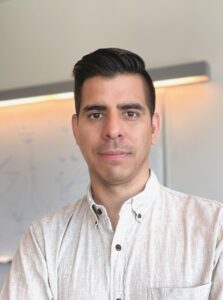
A rising star among us
Ivan Sanchez Esqueda is one of only ten professors in the country to receive the Intel Rising Star Award

Above: Ivan Sanchez Esqueda’s research on disruptive nanoelectronic computing technology has earned him an Intel Rising Star Award. Image courtesy of Shutterstock.

Assistant Professor Sanchez Esqueda
Ivan Sanchez Esqueda, an assistant professor of electrical engineering in the Ira A. Fulton Schools of Engineering at Arizona State University, has been named an Intel 2021 Rising Star Faculty Award recipient.
The RSA program recognizes early-career faculty members who show great promise as future academic leaders in disruptive computing technologies. It also seeks to attract and support the participation of women and minorities in STEM careers.
“I’m honored and excited for this opportunity,” says Sanchez Esqueda, who will use part of the financial award for collaborative research with Intel. “I look forward to developing fruitful collaborations with Intel researchers.”
Sanchez Esqueda’s work will emphasize building blocks for next-generation spintronics, spin-orbitronics and spin-based memory for neuromorphic computing systems. Spintronics is an alternative approach to computing that’s based on electron spin instead of electric charge. Information is carried in the charge and spin of an electron that could potentially create devices with a greater capacity to receive and parse data.
Stephen Phillips, director of the School of Electrical, Computer and Energy Engineering, one of the seven Fulton Schools notes that “Ivan is an innovator who is already having an impact in his field.”
Intel’s recognition of Sanchez Esqueda’s research is a confirmation of “his groundbreaking contributions to spintronics and disruptive computing technology,” says Phillips.
Sanchez Esqueda leads the ISE lab at ASU, which researches nanoscale electronic devices for computing systems. This includes devices constructed from two-dimensional, or 2D, materials such as graphene, molybdenum disulfide, or MoS2, and hexagonal boron nitride, or h-BN, as well as one-dimensional, or 1D, materials like carbon nanotubes.
Currently, they are exploring devices based on 2D materials that can be applied to machine learning hardware and neuromorphic, brain-like computing applications.
In addition, the team is studying magnetic devices based on 2D materials and stacks of 2D materials, also known as van der Waals heterostructures, for memory and computing applications.
The research group is developing conventional devices like field-effect-transistors using novel 2D materials to improve their performance at the nanoscale level and to explore new functions enabled by the properties of these materials.
Beyond the lab, Sanchez Esqueda is developing a special topics course on nanoelectronics and will use a portion of his award for materials and supplies to help inspire his students in the classroom.



































